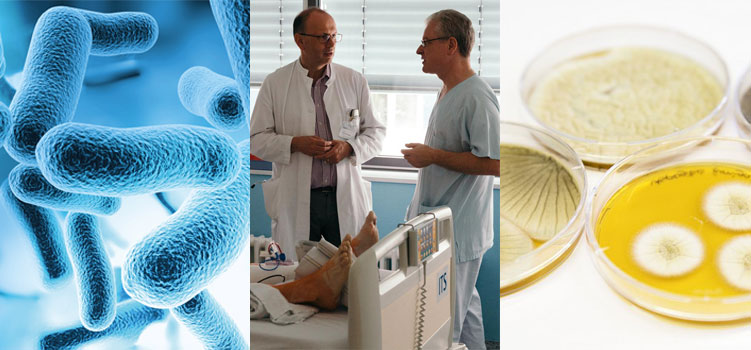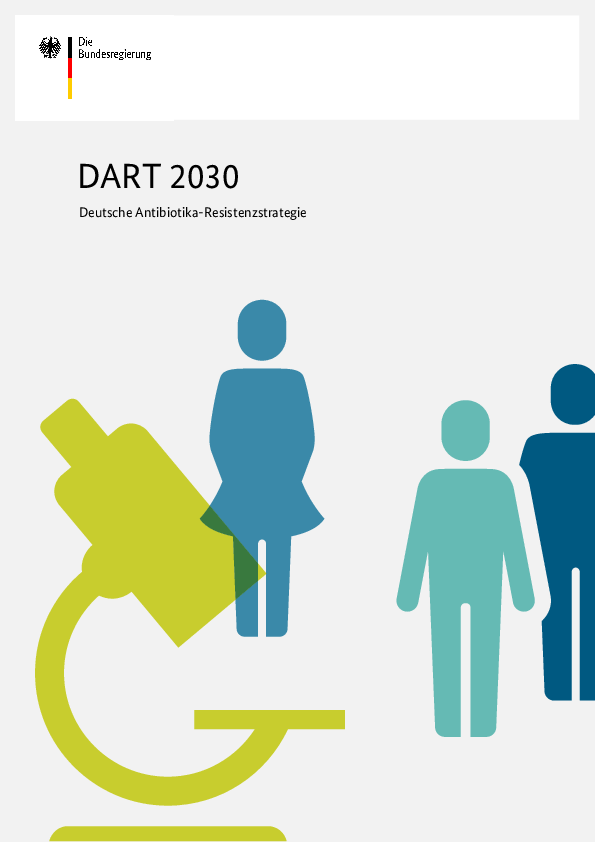Not only pandemics and epidemics threaten humanity. Even infections that are usually harmless are increasingly becoming a threat because our most important tools against these diseases, antibiotics, are losing their effectiveness due to a gradual increase in resistant pathogens.
Initial signs of severe complications, for instance sepsis, are often non-specific and make early personalized therapy difficult. In the event of a life-threatening infection, every minute counts. Faster and better diagnostic procedures have great potential to enable physicians to quickly initiate targeted therapies.

DART 2030 – German Antimicrobial Resistance Strategy*

Antimicrobial resistance (AMR) is increasing on a global scale and poses an ever-greater challenge when treating patients in human and veterinary medicine. Its impact means that only a few or in some cases no treatment options are available in treating bacterial infections that were previously treated with ease. Also, many of the achievements attained in modern medicine, such as joint replacements, chemotherapy in treating cancer (…) would be unthinkable without effective antibiotics.
Preventing the further spread of AMR calls for a package of measures which are to be implemented in a range of different areas. The Global Action Plan on Antimicrobial Resistance adopted by the World Health Assembly in 2015 calls upon member states to devise their own national action plans. Taking account of the goals set out in the Global Action Plan, these national action plans are to contain measures which are aligned to the actual situation in each country. (…) This is where DART 2030 comes in, the aim being to further address the outcomes of its predecessor strategy, DART 2020.
Handlungsfelder der DART 2030
1. Prevention
Infection control measures help reduce infections, which in turn lessens the need for antibiotics. Prevention includes not only hygiene measures and vaccinations but also containing the emergence and spread of antimicrobial resistance in and via the environment as well as preventing the spread of AMR along the food chain.
2. Surveillance und Monitoring
Surveillance und Monitoring von Antibiotikaeinsatz und Antibiotika-Resistenzen sind notwendig, um in sämtlichen Bereichen den derzeitigen Stand feststellen sowie Verläufe und Trends erkennen zu können. Sie sind eine Voraussetzung, um gezielt Maßnahmen ergreifen und deren Wirkung messen zu können.
3. Appropriate Use of Antibiotics including Laboratory Diagnostics
The purpose of antibiotic stewardship (ABS) is to ensure indication-appropriate use of antibiotics and the best possible antibiotic treatment and to help reduce the development of AMR. ABS includes reliable diagnostics and the choice of a suitable antibiotic, specifying the appropriate duration of treatment course, dosage and pharmaceutical form.
4. Communication and Cooperation
The dissemination of knowledge is intended to raise awareness of the problems with infections addressed here as well as the causal link between indiscriminate antibiotic treatment and the emergence of AMR. Moreover, the dissemination of knowledge in and by specialist groups, including in medical training and further and continuing training is to be intensified. Another element is the exchange among the sectors involved and stakeholders.
5. European and International Health Policy
AMR is a global challenge that does not stop at national borders. Global trade and travel result in a closely knit network encompassing all regions of the world. Therefore, resistances that develop anywhere can lead to the global spread of pathogens that no longer respond to treatment. AMR poses a global health threat and has major implications for the global economy and food security. Therefore, international cooperation is essential to control the emergence and spread of AMR globally.
6. Research and Development
Research and innovation can contribute significantly to reducing AMR. This makes it necessary to support all relevant research areas – spanning from basic research, clinical research, healthcare research, research on public health issues, environmental and climate research, logistics research to collaborative research with the health and food sectors, agriculture, the building and construction sector, the healthcare sector as well as media and communications. In all phases of research and development, an understanding of prevailing needs and clinical practice must be created and given adequate consideration.
*) “DART 2030 – German Antimicrobial Resistance Strategy“, as at July 7, 2025, developed by the Federal Ministry of Health together with the Federal Ministry of Education and Research, the Federal Ministry of Food and Agriculture, the Federal Ministry for the Environment, Nature Conservation, the Nuclear Safety and Consumer Protection and the Federal Ministry for Economic Cooperation and Development. Read full text here.
